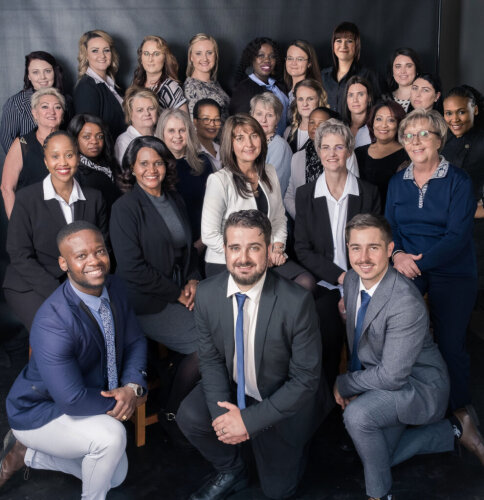Best Restructuring & Insolvency Lawyers in Roodepoort
Share your needs with us, get contacted by law firms.
Free. Takes 2 min.
List of the best lawyers in Roodepoort, South Africa
South Africa Restructuring & Insolvency Legal Articles
Browse our 2 legal articles about Restructuring & Insolvency in South Africa written by expert lawyers.
- Cross-Border Insolvency: Protecting Assets in South Africa
- Legal Framework: South Africa governs cross-border insolvency through the Cross-Border Insolvency Act 42 of 2000, which incorporates the UNCITRAL Model Law. Mandatory Recognition: Foreign liquidators or "representatives" have no standing to deal with South African assets until they obtain a formal recognition order from a South African High Court. COMI... Read more →
- Business Rescue Proceedings in South Africa for Directors
- Business rescue is a formal rehabilitation process designed to save "financially distressed" companies from liquidation. A general moratorium is triggered immediately, providing legal protection against creditor claims and asset seizures. The Business Rescue Practitioner (BRP) takes full management control of the company, effectively displacing the board's autonomous authority. Directors face... Read more →
About Restructuring & Insolvency Law in Roodepoort, South Africa
Restructuring and insolvency law in Roodepoort, South Africa focuses on helping individuals, businesses, and financial institutions navigate financial distress. Insolvency refers to a situation where a person or company is unable to pay their debts. Restructuring involves reorganizing the financial and operational aspects of a business to avoid insolvency or to manage the legal consequences thereof. Roodepoort, like the rest of South Africa, applies national insolvency legislation such as the Insolvency Act of 1936, the Companies Act of 2008, and other related laws. These laws aim to protect debtors and creditors alike, offering pathways for debt relief, business rescue, liquidation, and rehabilitation.
Why You May Need a Lawyer
There are several situations where obtaining legal assistance is crucial in matters of restructuring and insolvency:
- If you are unable to pay creditors and are facing possible sequestration or liquidation proceedings.
- If your business is struggling financially and you are considering business rescue or restructuring.
- If creditors have initiated legal proceedings to collect outstanding debts.
- If you have received a notice of insolvency or liquidation as a director of a company.
- If you need to negotiate with creditors or draft repayment agreements.
- If you require guidance on protecting your personal or business assets within the law.
- If you wish to understand your rights and potential liabilities during insolvency or restructuring procedures.
An experienced lawyer can provide objective advice, help you understand your legal position, and protect your interests throughout the process.
Local Laws Overview
The main laws governing restructuring and insolvency in Roodepoort are national statutes, but their application often involves local courts and legal professionals in Roodepoort. Key aspects include:
- Insolvency Act of 1936: Governs personal and business insolvency, liquidation of assets, and the distribution of assets among creditors.
- Companies Act of 2008: Introduces the concept of business rescue, aiming to rehabilitate financially distressed companies rather than liquidating them immediately.
- Business Rescue: Provides mechanisms for companies in financial trouble to reorganize. An appointed business rescue practitioner manages this process to maximize the chances of the company continuing to operate or, if that is not possible, to secure a better return for creditors than in liquidation.
- Asset Protection and Creditor Rights: Legal frameworks exist to balance the interests of creditors with the protection offered to debtors, ensuring fair and orderly resolution of debt issues.
- Debt Rehabilitation: Allows individuals to apply for rehabilitation after sequestration, ending certain legal restrictions attached to insolvency.
- Local Application: Matters are often heard in the local divisions of the High Court, such as the South Gauteng High Court, with Roodepoort falling under its jurisdiction.
Frequently Asked Questions
What is the difference between insolvency and bankruptcy?
In South Africa, the term “insolvency” is commonly used for individuals and businesses that cannot pay their debts, while "bankruptcy" is not formally used in South African law. Legal processes for individuals are called sequestration, and for companies, liquidation.
What is business rescue, and when is it an option?
Business rescue is a legal process allowing financially distressed companies to reorganize and try to continue trading. It is an option before liquidation and is available only if there is a reasonable prospect of saving the business.
Can I be held personally liable for company debts?
Generally, directors are not personally liable for company debts unless they signed personal surety or acted recklessly, fraudulently, or in breach of their duties.
How does liquidation work in Roodepoort?
Liquidation is the process in which a company’s assets are sold off to pay creditors. Once liquidated, the company ceases to exist. The process can be voluntary or court-ordered, and is handled by a liquidator under the supervision of the court.
What happens if I am sequestrated as an individual?
If sequestrated, your estate is surrendered to a trustee, who manages the sale of your assets to pay creditors. You lose control over your estate until you are rehabilitated by the court.
Can I keep some assets during insolvency?
Certain assets are protected by law and cannot be attached, such as necessary clothing, bedding, and sometimes tools of trade. It is best to consult a lawyer to understand what may be protected in your situation.
What does rehabilitation mean after sequestration?
Rehabilitation is a process where a sequestrated individual is relieved from the legal restrictions of insolvency. It is granted by the court, usually after a set period or once certain requirements are met.
What are my rights as a creditor during liquidation or sequestration?
Creditors have the right to submit claims, attend meetings, and share in the distribution of assets. Secured creditors often have priority over unsecured creditors.
How long does the liquidation or sequestration process take?
The duration varies based on the complexity and size of the estate or business. Some cases are resolved in a few months, while others take years.
Should I negotiate with creditors or seek court intervention?
Negotiating directly with creditors is often encouraged and can lead to more flexible arrangements. However, if negotiations fail or if legal action is already underway, court intervention may be necessary to protect your interests.
Additional Resources
If you are seeking more information or need guidance, the following resources and organizations can be helpful:
- South African Department of Justice and Constitutional Development: Provides information on insolvency, liquidation, and business rescue processes.
- South African Law Society: Lists qualified legal professionals and can assist in finding insolvency specialists in Roodepoort.
- Companies and Intellectual Property Commission (CIPC): Handles business rescue filings and provides resources on company law.
- National Credit Regulator: Assists individuals struggling with debt and offers information on debt counselling and consumer rights.
- Local Roodepoort Legal Aid Clinics: Provide free or affordable legal advice to individuals in financial distress.
Next Steps
If you are in Roodepoort and are considering restructuring or are facing insolvency, it is recommended to take the following steps:
- Review your financial position and gather all relevant documents, including loan agreements, statements, and correspondence.
- Arrange a consultation with a qualified restructuring and insolvency lawyer familiar with local and national laws.
- Discuss all available options, including negotiation, business rescue, liquidation, or sequestration, based on your unique circumstances.
- Act promptly. The earlier you seek advice, the more options you may have and the better you can protect your assets and interests.
- Engage with relevant local resources or organizations for extra guidance or support.
Professional legal guidance can help you navigate complex processes, protect your rights, and work toward the best possible outcome during financial distress.
Lawzana helps you find the best lawyers and law firms in Roodepoort through a curated and pre-screened list of qualified legal professionals. Our platform offers rankings and detailed profiles of attorneys and law firms, allowing you to compare based on practice areas, including Restructuring & Insolvency, experience, and client feedback.
Each profile includes a description of the firm's areas of practice, client reviews, team members and partners, year of establishment, spoken languages, office locations, contact information, social media presence, and any published articles or resources. Most firms on our platform speak English and are experienced in both local and international legal matters.
Get a quote from top-rated law firms in Roodepoort, South Africa — quickly, securely, and without unnecessary hassle.
Disclaimer:
The information provided on this page is for general informational purposes only and does not constitute legal advice. While we strive to ensure the accuracy and relevance of the content, legal information may change over time, and interpretations of the law can vary. You should always consult with a qualified legal professional for advice specific to your situation.
We disclaim all liability for actions taken or not taken based on the content of this page. If you believe any information is incorrect or outdated, please contact us, and we will review and update it where appropriate.










